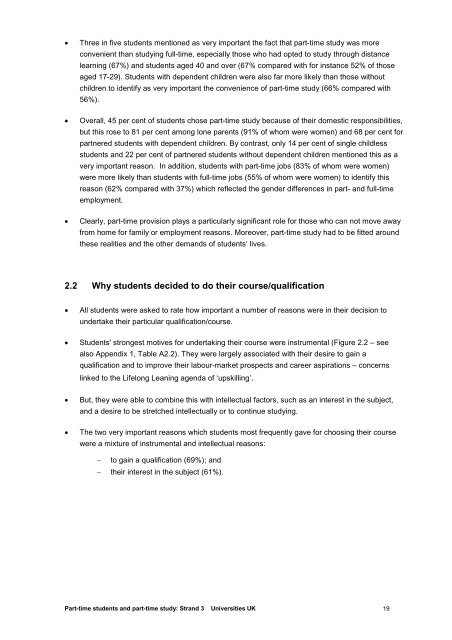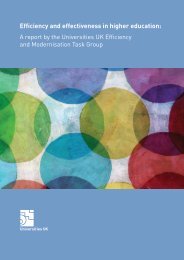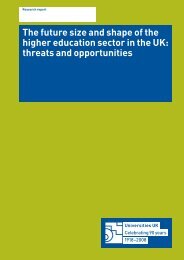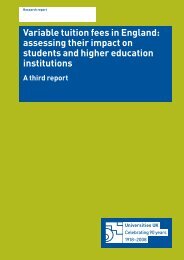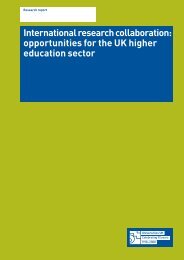Part-time Students And part-time Study In Higher ... - Universities UK
Part-time Students And part-time Study In Higher ... - Universities UK
Part-time Students And part-time Study In Higher ... - Universities UK
You also want an ePaper? Increase the reach of your titles
YUMPU automatically turns print PDFs into web optimized ePapers that Google loves.
• Three in five students mentioned as very important the fact that <strong>part</strong>-<strong>time</strong> study was moreconvenient than studying full-<strong>time</strong>, especially those who had opted to study through distancelearning (67%) and students aged 40 and over (67% compared with for instance 52% of thoseaged 17-29). <strong>Students</strong> with dependent children were also far more likely than those withoutchildren to identify as very important the convenience of <strong>part</strong>-<strong>time</strong> study (66% compared with56%).• Overall, 45 per cent of students chose <strong>part</strong>-<strong>time</strong> study because of their domestic responsibilities,but this rose to 81 per cent among lone parents (91% of whom were women) and 68 per cent for<strong>part</strong>nered students with dependent children. By contrast, only 14 per cent of single childlessstudents and 22 per cent of <strong>part</strong>nered students without dependent children mentioned this as avery important reason. <strong>In</strong> addition, students with <strong>part</strong>-<strong>time</strong> jobs (83% of whom were women)were more likely than students with full-<strong>time</strong> jobs (55% of whom were women) to identify thisreason (62% compared with 37%) which reflected the gender differences in <strong>part</strong>- and full-<strong>time</strong>employment.• Clearly, <strong>part</strong>-<strong>time</strong> provision plays a <strong>part</strong>icularly significant role for those who can not move awayfrom home for family or employment reasons. Moreover, <strong>part</strong>-<strong>time</strong> study had to be fitted aroundthese realities and the other demands of students’ lives.2.2 Why students decided to do their course/qualification• All students were asked to rate how important a number of reasons were in their decision toundertake their <strong>part</strong>icular qualification/course.• <strong>Students</strong>' strongest motives for undertaking their course were instrumental (Figure 2.2 – seealso Appendix 1, Table A2.2). They were largely associated with their desire to gain aqualification and to improve their labour-market prospects and career aspirations – concernslinked to the Lifelong Leaning agenda of ‘upskilling’.• But, they were able to combine this with intellectual factors, such as an interest in the subject,and a desire to be stretched intellectually or to continue studying.• The two very important reasons which students most frequently gave for choosing their coursewere a mixture of instrumental and intellectual reasons:− to gain a qualification (69%); and− their interest in the subject (61%).<strong>Part</strong>-<strong>time</strong> students and <strong>part</strong>-<strong>time</strong> study: Strand 3 <strong>Universities</strong> <strong>UK</strong> 19


